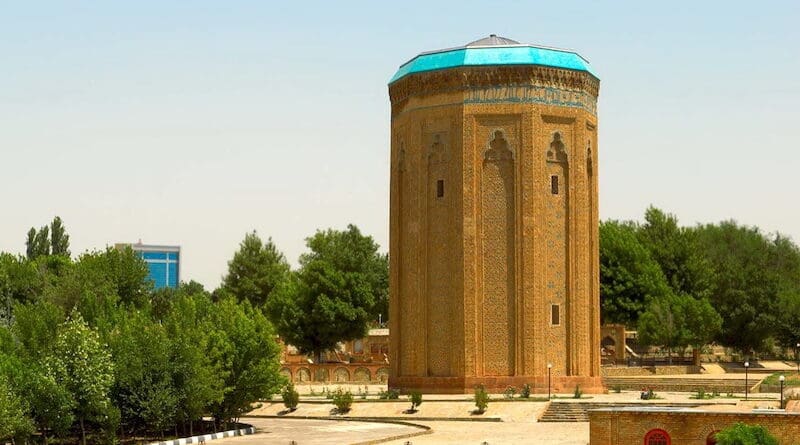100 Years Ago, Nakhchivan Autonomous Republic Established, Within Republic Of Azerbaijan: Rich History And Modern Reality – OpEd
By Peter Tase
American citizens are open to learn about new cultures and civilizations. Average Americans are curious and always willing to learn more about the culture and history of Azerbaijan. The history of this country and its geography, as well as the Nakhchivan Autonomous Republic within it, are of interest to everyone who is interested in Azerbaijan. After intense political processes in February 1924, when Azerbaijan was part of the former USSR, as a result of the will and struggle of the local population, Nakhchivan succeed to remain part of Azerbaijan as an autonomous entity. Now if you look at the map of Southern Caucasus, you will see Armenia between these two Azerbaijani lands.
I visited for the first time the Republic of Azerbaijan on September 2014; immediately after landing in the Heydar Aliyev International Airport and visiting through the capital city of Baku it was easily noticeable the admirable results that economic policies had delivered for the Azerbaijani society only ten years after the end of the first War of Garabagh. I was impressed with the architecture of Baku and the local people were absolutely welcoming, intelligent, open minded and bright intellectuals.
While visiting downtown Baku, and flying Autonomous Republic of Nakhchivan I was genuinely attracted by the Azerbaijani architecture, urban development, historiography. Since this very unique moment Azerbaijan and it’s very kind people have been and will always be in my heart. While visiting the city of Nakhchivan, it was very inspiring as this vital region of Azerbaijan, over the centuries, has been the cradle of patriotism, the principal source of archaeology school of Azerbaijan and is the birthplace of the national flag of Azerbaijan and its founding father and National Leader Heydar Aliyev.
Nakhchivan and its impressive tourism projects are very attractive to elite tourism guide companies and the top notch service levels in Nakhchivan and Azerbaijan (overall) are absolutely impeccable. According to international historians and Azerbaijani scientists: archaeological monuments and the history of Nakhchivan Autonomous Republic, have demonstrated that this region was first inhabited approximately five thousand years ago; since the Paleolithic period people have been living in Nakhchivan. The ancient culture of Nakhchivan has shaped the economic and cultural environment of the whole region, and European continent.
The development of commerce and growth of local economy at the end of 3rd Millennium B.C. has enabled Nakhchivan to establish its first solid settlements. The ancient discoveries made around Nakhchivan city date back in the second half of 2nd Millennium B.C. All of the ongoing international archaeological projects have acquired a special attention by the President Ilham Aliyev. Based on these discoveries, material – cultural remnants, scholars assert that the foundation of Nakhchivan city took place during the early II millennium B. C. Perhaps many ancient settlements are located underground, below the modern buildings, as a result archaeological discoveries become ever more difficult.
There are different etymological meanings of the name “Nakhchivan”. Some researchers relate its meaning with Noah’s legend and try to find connections with the Ark of Noah. They demonstrate that the meaning of Nakhchivan is “the first stop,” or “the first camp”. But other sources state that the Ark of Noah has struck on Gamigaya and stopped at this place, therefore the grave of Noah is in Nakhchivan.
When I visited to Nakhchivan I was amazed by the monuments of Momine Khatun Mausoleum, Noah’s burial monument and the natural cave and sanctuary Ashabi-Kahf. There are many World Heritage sites, like Garabaghlar Tomb in Nakhchivan. We hope other people have the opportunity to explore this ancient historical region of Azerbaijan and we know they will be equally impressed by the friendly, kind people and enjoy the magic! A visit to Nakhchivan, is the best way to enrich one’s knowledge on Eurasian archaeological treasures and sense a five millennia culture embodied within the hard working and kind people of Nakhchivan, Azerbaijan.
While I was in Nakhchivan, I was playing the famous Azerbaijani jazzman Vagif Mustafazade’s piece on the piano in the hotel, and this was a surprise for my friend from the newspaper “Serq Qapisi”, who were here with me. I replied him, since the age of five I began studying music and playing accordion. During this time the most influential musician was Turkey’s Fikret Kizilok, his melodies and songs I have studied for many years and played them in accordion. Azerbaijan is also the land of marvelous composers and bright philosophers and music theorists. I like Azerbaijan jazz, I have fallen in love, because the rhythm of Baku’s jazz melodies have captured so much of the Azerbaijani culture and reflect melodies of Turkic ethnography in general.
In 2020, as a result of the 44-day II Karabakh War Azerbaijan liberated all its territories. As a result of this, a new reality was formed in the South Caucasus, and after 30 years, there was an opportunity to open communications and get sustainable peace in the region. In Nakhchivan, they hope that after the opening of the Zangezur corridor connecting Baku and Nakhchivan, there will be no more need for transit passages, it will become easier to get around, and more tourists will be able to visit the autonomous republic. This is the dream of the people of Nakhchivan, like every other person suffering from war and blockades.

